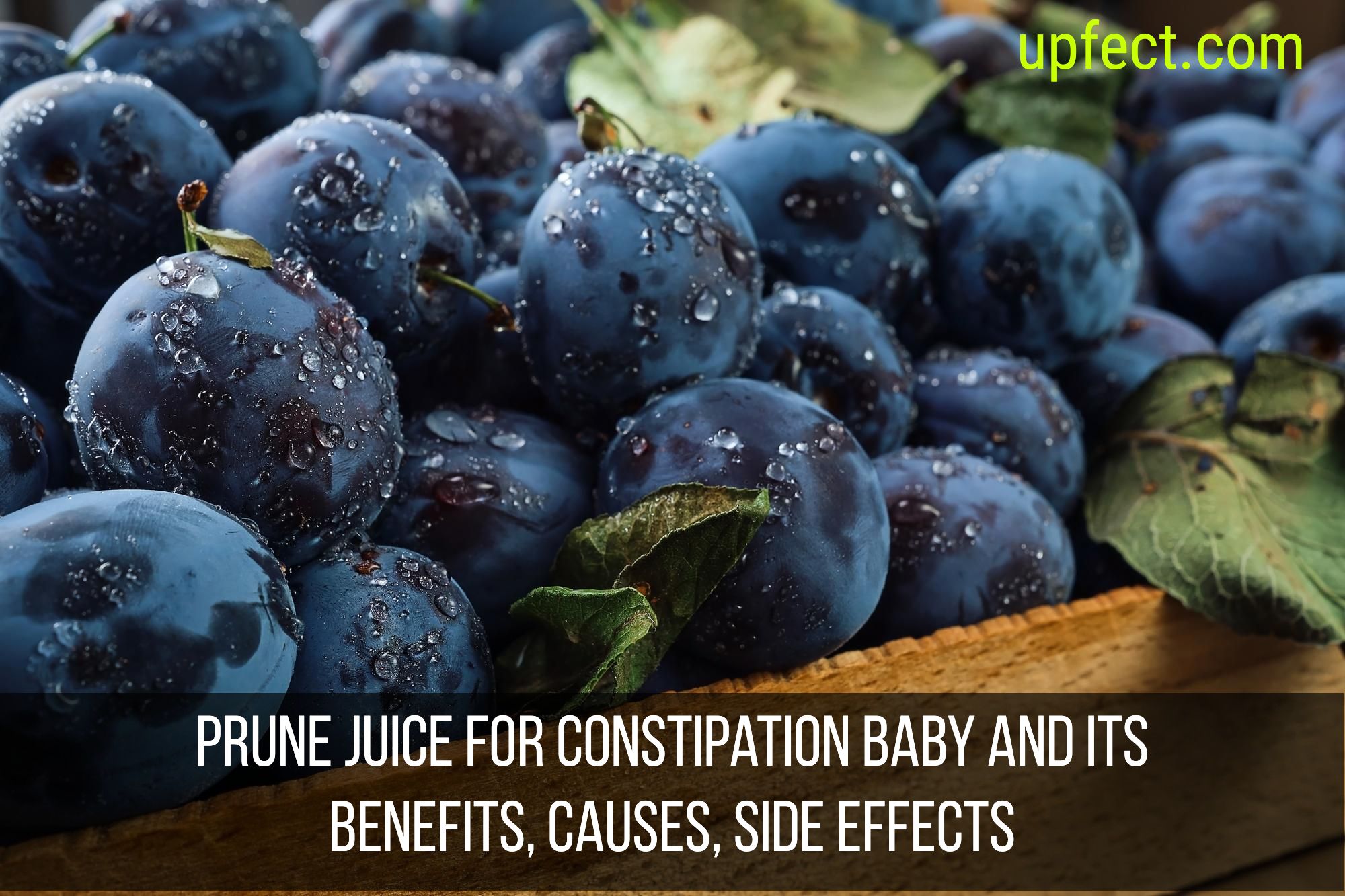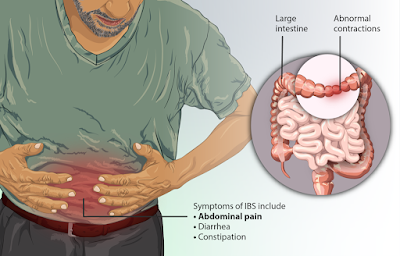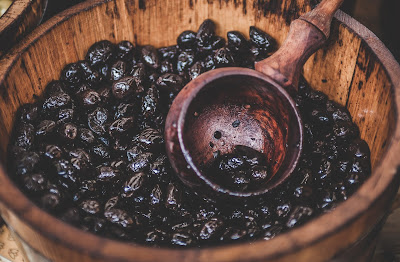
Prune juice
Prune juice is extensively used for constipation in babies. It is a natural and safe laxative that works well for bowel movements in most babies. A compound called sorbitol along with other phenolic acids in the prune juice provides laxative capabilities. Drinking prune juice is key for helping your digestive system works. In addition to treating constipation, prune juice is also a good source of iron, potassium, and many vitamins and other nutrients.
Potassium helps balance levels of sodium in the blood. Prunes juice may also help control obesity, diabetes, and cardiovascular disease and reducing bacterial growth in the urinary tract. So, prune juice is the most effective treatment for constipation in both children and adults. Prune juice contains vitamin A is vital for reducing problems related to the skin. Prune juice can also cause weight gain fruit.
According to Mayo clinic grown-up, infants can benefit from 2-4 oz of prune juice. Some risk of prune juice increased risk of diarrhea.
Prune Juice for Constipation baby
In the case of babies, pellets like poop or hard stools are the main symptoms of constipation in babies. some babies may withhold the stools as they may not like to strain. This worsens the condition. They may cry with the pain and discomfort of constipation. Parents have to learn to identify the symptoms and treat them with natural remedies like prune juice before reaching out to medicines.
Babies fed with breast milk generally pass their stools normally and do not have any constipation. You can also dilute the trimmed juice with water to help your baby be hydrated. Prune juice can be great for helping with constipation, especially in babies.
Prune juice is a natural laxative and can help relieve constipation in children. This juice is often recommended as a natural remedy for constipation in children. It is high in fiber and sorbitol, which can help soften the stool and make it easier for your baby to pass stools.
Here are some general guidelines for giving prune juice to a constipated child:
- Start by mixing a teaspoon of prune juice with an equal amount of water and then gradually increase the amount as needed.
- It is best to give prune juice in the morning when your baby is more likely to have bowel movements during the day, as it provides more benefits.
- Make sure your baby is drinking enough fluids such as breast milk, formula, or water to avoid dehydration.
Treatments for Baby Constipation
Prune juice is extensively used for constipation in babies. Parents have to learn to identify the symptoms and treat them with natural remedies like prune juice before reaching out to medicines. However, babies on formula are more prone to hard stools. Even if the formula is changed, the baby may get constipation symptoms.
But, the introduction to solid food is one of the most prominent causes of constipation in babies. This is because their digestive system is not matured yet. In such cases, you can delay the introduction of solid foods by a few weeks or even a few months. This is the right age when you can introduce prune juice for baby constipation. Although you can also use it when the baby is on formula food.
In addition to treating constipation, prune juice is also a good source of iron, potassium, and many vitamins and other nutrients. It is also a much safer and side-effect-free remedy as compared to chemical-based medicine. According to Mayo clinic grown-up, infants can benefit from 2-4 oz of prune juice. You can give prune juice alone with a spoon to your baby. The baby may not like the taste initially and reject it.
In that case, you introduce prune juice in the baby formula. Later, you can try prune juice alone once the baby becomes familiar with the taste. You can add 1 tablespoon of prune juice to baby formula or pureed prunes in solid food.
There are many treatments to relieve constipation in babies. For this, children need to be added to the diet some food. For example:
- Fiber-Rich Food: for babies over six months, add mashed high-fiber foods like skinless apples, broccoli, potatoes, and whole-grain bread into the diet.
- Change the milk: if your baby is breastfeeding, try adjusting your diet. Bottle-fed babies may benefit from a different type of formula, at least until constipation clears.
- Increase the intake of fluids: babies older than six months can be given lukewarm water, milk, and juices to hydrate.
- Massaging: massaging your baby’s tummy may stimulate the bowels to pass through. Use a little oil in a circular motion, over the stomach and lower abdomen.
- Exercise: exercise speeds up digestion. If your baby is not walking yet, exercises like a leg bicycle and other movements may be helpful.
Signs of Constipation in Infants:
- Fussy baby
- The baby cries with the pain and discomfort of constipation.
- Spitting up more than usual.
- The main signs of Constipation in infants are pus or hard stools.
- Straining more than 10 minutes without success.
Causes of Constipation in Babies
In this article, we tell you what are the main causes of constipation in babies.
- Drinking less water makes the stool harder which leads to more constipation.
- Overeating processed food like cake, bread, cheese, etc can take several to exit our body and can be the primary reason behind chronic constipation, meaning in passing dry, hard poop followed by pain and strain.
- Milk protein in formula milk can cause constipation in babies. Switching from breast milk to formula can also cause this discomfort. Formula milk contains complex proteins that harden poop, thus causing constipation.
- Some babies find it hard to digest rice resulting in constipation.
- Another cause of constipation in babies is complementary feeding rather than exclusive breastfeeding.
- Cheese is low in fiber and can cause constipation.
Best Foods to Relieve Constipation
Here are some foods that can relieve your infant from constipation.
- Prunes are enriched with potassium, vitamin A, and fiber. Prune contains a high amount of fiber. Prune can help food to pass through the digestive system more efficiently. Moreover, prunes also contain phenolic compounds that can stimulate beneficial gut bacteria. It has a laxative effect on the body naturally.
- High fiber in bananas can help normalize bowel motility. Banana can also help eliminate constipation issues.
- Apple is rich in fiber. Apples contain sorbitol, fructose, and high levels of water, which can help to ease digestion and prevent constipation. Apples are an easy way to boost the fiber content of your diet and alleviate constipation.
- Pulses most beans, lentils, chickpeas, and peas are very high in fiber, which promotes good digestion and reduces constipation. In addition, pulses also contain substantial quantities of other nutrients that help to ease constipation, such as potassium, zinc, and vitamin B6.
- Avocados contain a high amount of fiber and keep the bowel movements normal. Avocados contain many vitamins, minerals, and natural fiber that can help prevent constipation.
- Greens such as spinach, Brussels sprouts, and broccoli are not only rich in fiber but also great sources of vitamin C, K, and folate. These greens help add bulk and weight to stools, which makes them easier to pass through the gut.
- Papaya fruit contains a large amount of fiber and water. The papain enzyme in papaya can make protein easier to digest. People in the tropics consider papaya to be a remedy for constipation, and other symptoms of irritable bowel syndrome.
How to Avoid Constipation in Babies
How can we avoid constipation in babies is obviously to stop giving cow’s milk and formula milk till the baby reaches one year of age after one year you can start with cow’s milk, now another thing is mainly to increase the fluid intake of the baby, usually the baby requires 3 to 4 cups of water that is around 500 to 700 ml of water per day. The baby doesn’t take this much the babies tend to get a very hard stool, another thing to increase the fiber intake.
Fiber can be in the form of fruits, vegetables, vegetables in sense like a green leafy vegetable pumpkin the route veggies and all those things and thinks and fruit may be in the form of fruit juices that is hundred percent fruit juices, not the fruits drinks which we get in the market is this can also help in reducing constipation because that increases the water intake from the body and it makes the stools bulkier and much more soften so the baby able to pass. This helps in the increase again the fiber content in the body and helps baby to pass much easier motion.
Food to Avoid to Prevent Constipation
Avoid Red meat: red meat is high in fat and low fiber. It takes a long time to digest completely. It has rich iron which causes constipation.
Unripe green bananas: unripe bananas have a lot of starch which is difficult for the body to digest.
Avoid Fast foods: fast foods and fried foods are low in fiber and high fat, which you need to help food move through your system. These are not easy to digest that may worsen constipation.
Cookies: Cookies are high in fat and low in fiber which causes digestion problems and strong supporters of constipation.
Avoid caffeine: caffeine dehydrates our body which leads to harder stool that is difficult to pass.
Avoid excessive alcohol: regular and excessive alcohol consumption affects our body which causes constipation. If you have a constipation problem avoid it completely.
Avoid chocolate: chocolate contains high fat which slows down the digestive system and leads to constipation.
Avoid frozen dinners: frozen foods, though high inconvenience, are often stripped of nutrients, including the fiber your body needs to maintain regular bowel movements.
How to Make Prune Juice
- First of all, take 3 to 4 fresh prunes and soak in 1/4 cup of hot water for 30 minutes or until soft. It will be soft after soaking.
- Transfer the soaked prunes to a blender and add in 3/4 cup of water.
- Spin for a few minutes. Blend it until smooth.
- Then strain the juice over a glass and press with a spoon to extract the juice. Prunes juice is ready!
Prune Juice Nutrition
Prune juice is high in antioxidants, vitamin K, fiber, and potassium. The potassium content in prune juice helps balance the levels of sodium in the bloodstream. Ten pitted prunes (100g) provide:
- water: 81.2 g
- Energy: 71 kcal
- Total Carbohydrates: 17.4 g
- Dietary Fiber: 1 g
- Sugar: 16.4 g
- Protein: 0.61 g
- Total Fat: 0.03 g
The same one-cup serving provides:
- Sodium: 4 mg
- Calcium:12 mg
- Potassium: 276 mg
- Phosphorus: 25 mg
- Magnesium: 14 mg
- Zinc: 0.21 mg
- Iron: 1.18 mg
- Copper: 0.068 mg
- Choline: 2.7 mg
prune juice also provides:
- Vitamin C: 4.1 mg
- Vitamin B-6: 0.218 g
Benefits of Prune Juice
- First, consuming Prune juice can help to promote overall digestion. It also acts as a mild and natural laxative, often attributed to its high levels of a compound known as sorbitol. Drinking prune juice is key for helping your digestive system works. In addition to treating constipation, prune juice is also a good source of iron, potassium, and many vitamins and other nutrients.
- Prune juice is also an excellent source of fiber, which can help beneficial bacteria in the gut to thrive, while also reducing digestive ailments such as constipation, bloating, and cramps.
- Prune juice is also very nutrient-dense and contains many different vitamins, minerals, and other nutrients. It is a great source of antioxidants and dietary fiber, vitamin B6, potassium, manganese, iron, vitamin C, and niacin to name a few. The potassium content in prune juice helps balance the levels of sodium in the bloodstream.
- Consuming Prune juice is also very heart-healthy and can reduce risk factors associated with heart disease. Drinking prune juice regulating can help to reduce the risk of atherosclerosis, while also importantly, lowering cholesterol levels.
- Prune juice can significantly reduce blood pressure and contains heart-healthy nutrients such as potassium and manganese.
- Prune juice can also help to protect our bones and keep them healthy and strong. Prune juice contains an important bone-healthy mineral known as boron which can promote strong bones and prevent bone ailments such as osteoporosis. It can also help to reduce bone density loss and bone mass loss.
- Prune juice can help to promote weight loss and healthy weight measurement.
- Prune juice contains fiber which can help to slow down digestion, increasing feelings of fullness and satiety. Prune juice has a low glycemic index which will help avoid blood sugar spikes and cravings.
Side Effects of Prune Juice
- Prunes juice contains insoluble fiber, which can cause or worsen diarrhea.
- Drinking too much-extracted juice can greatly increase a person’s calorie and sugar levels. Which is very harmful to the body.
- Prune juices contain a high amount of fiber.so, high fiber foods and drinks can hurt people with certain diseases, such as ulcerative colitis.
- Prune juices contain a high amount contain fiber which the fiber in the fruit can aid weight loss, taking them in excess can have the opposite effect.
- Prune juice is mostly used as irritant laxative. Laxative-producing foods can cause electrolyte and mineral imbalances and impair the function of the nerves and muscles of the colon.





Your articles are extremely helpful to me. Please provide more information!
Thank you.
Thank you for your articles. They are very helpful to me. May I ask you a question?
yes
Thanks for posting. I really enjoyed reading it, especially because it addressed my problem. It helped me a lot and I hope it will help others too.
I really appreciate your help
Please provide me with more details on the topic
May I have information on the topic of your article?